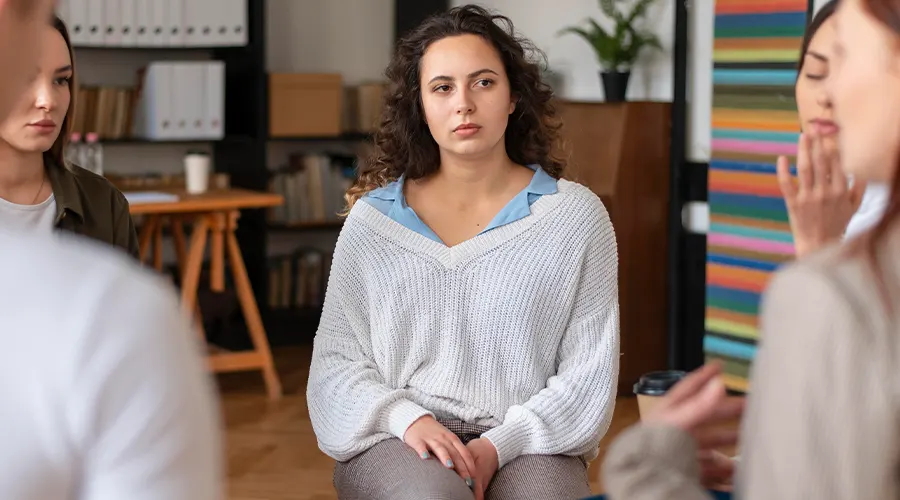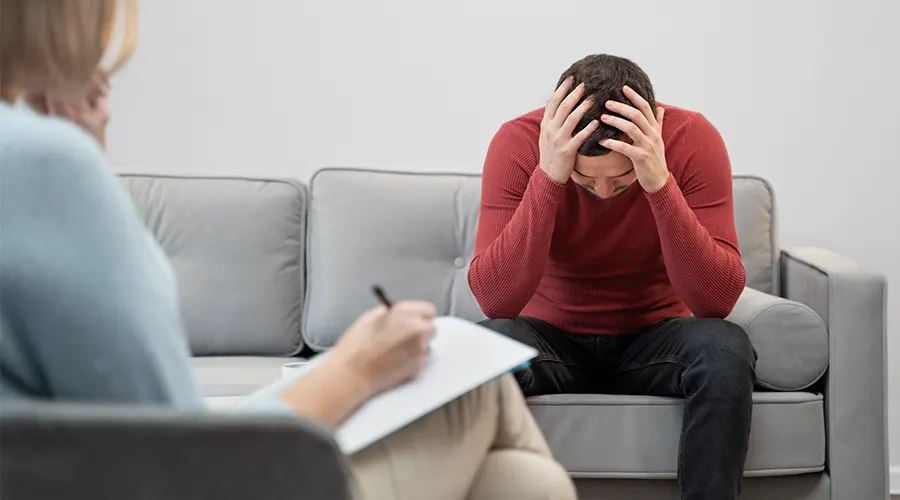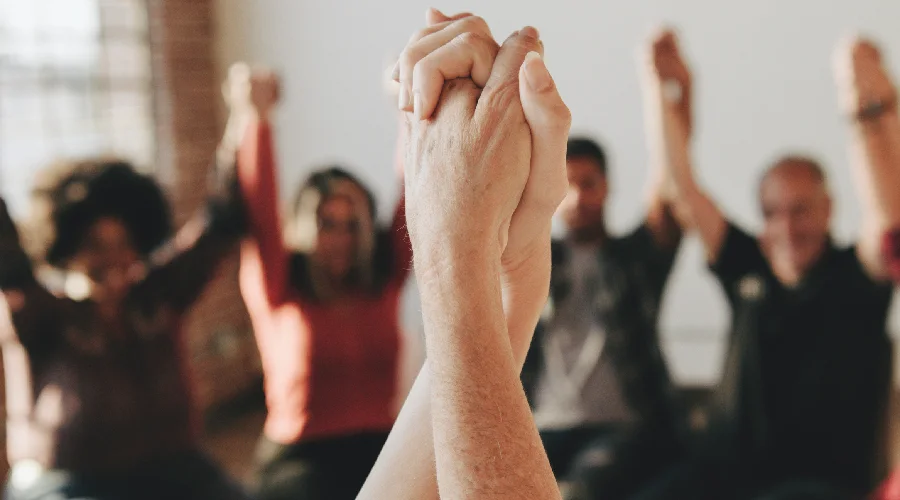Mental health encompasses our emotional, psychological, and social state of being, influencing our thoughts, emotions, and actions. It plays a crucial role in determining how we cope with stress, relate to others, and make healthy decisions, and is important throughout every stage of life, from childhood to adulthood.
Mental health is a state of well-being that allows individuals and communities to function at their best. It is closely linked to neurological disorders, which are a major category of non-communicable diseases (NCDs) affecting people's thoughts, emotions, behaviors, and relationships. Mental health encompasses a broad range of conditions such as depression, anxiety, substance abuse disorders, schizophrenia, dementia, Alzheimer's disease, and more, and it is estimated that 450-500 million people worldwide are affected by mental health conditions.
The ability to maintain good mental health is influenced by various factors, some of which are beyond an individual's control. These factors include social, environmental, psychological, and biological determinants, such as Alcohol and tobacco use, unhealthy diet, and physical inactivity. Mental health is closely linked to other non-communicable diseases including cancer, diabetes, cardiovascular and respiratory diseases, and they often co-occur.
It is also important to know that the terms "bad mental health" and "mental illness" are usually used alternatively, they are not synonymous. A person may experience poor mental health without a diagnosis of mental illness, and conversely, someone diagnosed with a mental illness may experience periods of physical, mental, and social well-being.
“There is no Health without mental healthâ€
Mental health is a crucial component of overall health, and its impact extends beyond the individual to the community and society. It is essential to prioritize mental health and address the various factors that contribute to bad mental health days to prevent and manage mental health conditions.
Why Mental health is Essential for Overall Health?
Mental health is important for overall health because it plays a crucial role in a person's overall well-being. Mental health affects how individuals think, feel, and behave, and it impacts various aspects of life, including relationships, work performance, and physical health. Mental health impacts various aspects of life, including physical health, relationships, work performance, and overall quality of life. Prioritizing and maintaining good mental health is essential for promoting overall health and well-being. Here are some reasons why mental health is essential for overall health:
Bad mental health can lead to physical health problems, such as heart disease, high blood pressure, and chronic pain. Good mental health can promote physical health improvement and healthy habits, such as regular exercise and healthy eating, which can reduce the risk of physical health problems.

In contrast to bad mental health, good mental health results in better coping skills that can help individuals better manage stress and cope with difficult situations. This can lead to improved resilience and the ability to recover more quickly from setbacks.
Mental health can improve communication skills and foster deeper and more fulfilling relationships with others. This can lead to improved social support, which can promote better overall health. Bad mental health lowers productivity whereas in contrast good mental health can improve work performance and increase productivity. This can lead to greater financial stability and improved overall well-being. That is why it is said that Good mental health can lead to a more positive outlook on life, increased happiness, and a greater sense of purpose and fulfillment.
What are the conditions of Bad Mental Health?
"Bad mental health conditions" could be perceived as stigmatizing and may not be the best way to describe mental health issues. Bad Mental health conditions are health issues that can affect anyone, and it is important to use language that does not contribute to stigma or discrimination. It is imperative to seek professional help if you or someone you know is experiencing symptoms of mental illness. However, some examples of mental health conditions that may cause distress or impairment in functioning include;
- Anxiety disorders
- Mood disorders (such as major depression or bipolar disorder)
- Personality disorders
- Psychotic disorders (such as schizophrenia)
- Eating disorders
- Substance use disorder
- Brain developmental disorders (such as attention-deficit/hyperactivity disorder or autism spectrum disorder).
What are the “Fundamentals†of Bad Mental Health?
In the case of having a bad mental health day, it is important to note that bad mental health is not always caused by external factors and can also result from internal factors, such as negative self-talk, perfectionism, and low self-esteem. Seeking professional help and support can help individuals identify the fundamentals of their bad mental health and develop a personalized plan to improve their mental health and well-being more specifically on bad mental health day.
The fundamentals of bad mental health can vary from person to person, as it can be caused by a range of factors. However, there are some common fundamentals of bad mental health that include:
Genetics and Family History: Some mental health conditions can be hereditary, increasing the likelihood of developing bad mental health.
Traumatic Life Events: Stressful and traumatic life events, like abuse, neglect, loss of loved ones, or natural disasters, can lead to bad mental health.
Chronic Stress: Exposure to long-term stress, such as financial difficulties, work-related stress, or relationship problems, can negatively affect mental health.
Social Isolation: Loneliness, a lack of social support, or social isolation can increase the risk of depression and anxiety.
Unhealthy Lifestyle Habits: Poor nutrition, substance abuse, lack of exercise, and sleep deprivation can contribute to bad mental health.

What are the Signs that indicate Bad Mental Health?
When we experience physical illness, such as a cold, a broken leg, or diabetes, it is due to something being amiss in our bodies. In contrast, when we experience bad mental health, it is due to something being amiss in our brains.
If you are unsure whether you have bad mental health, consider reflecting on your thoughts, feelings, and behaviors. Following are some common questions one can ask him/herself:
- Do you observe or notice any changes in your mental state?
- Are you experiencing thoughts or emotions that are overwhelming and unwanted?
- Do others seem unaffected by the same things that bother you?
- Is your experience typical or atypical?
Additionally, educating yourself about different mental illnesses can help you recognize if your experiences align with common symptoms, such as depression or anxiety. But experiencing one or more of these following symptoms does not necessarily mean you have bad mental health or illness, but it may be a good idea to seek professional help to determine the cause and find appropriate treatment if necessary. The signs that may indicate the presence of bad mental Health:
- Significant changes in mood, such as feeling sad or hopeless for an extended period of time
- Profound feelings of anxiety, fear, or worry
- Problems with too much or too little sleeping
- Changes in appetite or weight
- Withdrawal from activities and relationships that were once enjoyable
- Difficulty concentrating, remembering, or making decisions
- Experiencing unusual or intense beliefs or perceptions
- Involvement in activities or behaviors that harms you or others
- Feeling like you are unable to control your thoughts or actions
- Severe thoughts of self-harm or suicide
What are the tips to survive a bad Mental Health Day?
On days when your mental health isn't at its best, it can be challenging to be productive or even get out of bed. It's not uncommon to feel like you're stuck under a dark cloud, with no hope of feeling better. However, there are ways to help yourself through these tough times and start anew either later in the day or the following day. There are healthy strategies you can use to survive a mental health day and take care of yourself, even when you don't feel motivated.

1. Avoid Overworking Yourself
When you are having a bad mental health day or your mental health is struggling it's important not to overload yourself with a long to-do list on a day. While having the plan to tackle specific tasks can help you stay productive Recognize that how you felt yesterday may not be how you're feeling today and it's okay if you're unable to complete everything on your list. Instead of feeling guilty, focus on accomplishing what's absolutely necessary and leave the rest for a day when you're feeling better. This will help you avoid overwhelming yourself while reducing feelings of guilt.
2. Limit Phone Use
If possible, try to minimize your phone usage, especially when it comes to social media. The online world can easily draw us in with distorted portrayals of reality, leading to an unhealthy cycle of comparisons that can harm our self-esteem. This can escalate to feelings of stress, anxiety, and depression, making it crucial to avoid social media on difficult mental health days. Disconnecting from your phone for a day can offer a chance to truly unwind and avoid the constant influx of news and social updates. Taking a break from your phone can expedite your journey toward overcoming negative emotions.
3. Self Care
Many online blogs suggest complicated self-care routines like face masks or bubble baths, but these can be difficult to follow through on when you're lacking motivation. On bad mental health days, it's important to keep it simple and focus on doing only what is necessary. It's understandable if you don't feel like doing your hair, putting on makeup, or dressing up. Instead, try to make your bed, change out of your pajamas, or take a quick shower. These small acts of self-care can be considered successes on tough mental health days and should be celebrated as such. Recognizing and appreciating these small accomplishments can help you feel a little better over time.
4. Nutrition and Hydration are the most important
When you're having a bad day mentally, it can be challenging to muster up the energy to prepare a full meal. Instead of stressing over having three square meals, try snacking throughout the day on small, easy-to-eat items. Even if you're not feeling particularly hungry, snacks can provide the necessary nutrients to help you feel better. Additionally, staying hydrated is crucial. Make an effort to drink water regularly throughout the day to maintain your health and hydration levels.
5. Watch your favorite Show
When you are having a bad mental health day or when mental illness weighs heavy, it can be stifling and difficult to cope with. Some may feel as though happiness is unattainable after just one bad day. However, finding joy in small things can make a significant difference. Take a cozy seat, wrap yourself in a blanket, and tune in to your favorite show for some much-needed relaxation time. Watching a beloved show can elevate your mood and provide an opportunity to unwind while diverting your attention from any negative feelings or thoughts. Opting for a comedy could even spark endorphins through laughter.
6. Sit outside and feel the sunshine
It's common to feel the urge to isolate and stay indoors when experiencing a bad mental health day. However, this can have the opposite effect of what is desired and worsen feelings. If possible, challenge yourself to step outside and bask in the sunshine. No need to take a long walk or exert yourself excessively; simply sitting outside, feeling the sun's warmth on your face, and taking in the surroundings can do wonders for boosting your mood and energy. Research has revealed that even just sitting outside can have a positive impact. Basking in the sun's glow can make a significant difference and improve your outlook on life.
7. Be kind to yourself
Don’t blame yourself for feeling the way you usually do. Just be kind to yourself as you would be to a friend.
8. Reach out for support
Call a trusted friend or family member, or reach out to a mental health professional for support.
9. Get moving
Get moving by doing exercise as exercise can release endorphins, which can improve mood and reduce stress. Walking and stretching can also be helpful in this regard
10. Write it down
Writing down your thoughts and feelings can also help you process the bad mental health day effectively.
What help one can seek in case of having a Bad Mental Health Day?
“Seeking help for bad mental health issues is a sign of strength, not weaknessâ€.
There is no shame in asking for help, and it is important to prioritize your mental health and well-being. If you are struggling with bad mental health, there are many sources of help available. Some options you can consider are:
- Seek help from a mental health professional: A mental health professional, such as a therapist or counselor, can help you work through your feelings and develop coping strategies. They can also provide you with resources and referrals if you need additional support.
- Talk to a trusted friend or family member: Sometimes, just talking to someone who cares about you and understands you can make a big difference.
- Contact a helpline: There are many helplines available that offer support for a range of bad mental health issues. They can provide you with someone to talk to, as well as information and resources.
- Join a support group: Support groups offer a safe and supportive space where you can share your experiences with others who are going through similar challenges.
- Prioritize self-care: Make sure you are taking care of yourself by getting enough sleep, eating well, and engaging in activities that bring you joy and relaxation.


